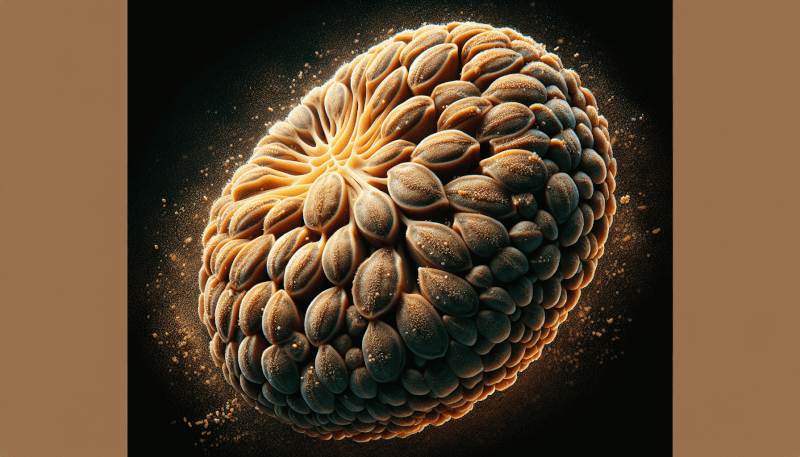Hey there! Did you know that broccoli seeds contain a powerful compound called glucosinolates? These tiny seeds are packed with nutrients and have incredible health benefits. In this article, we’ll explore the fascinating world of broccoli seeds and how their glucosinolates can boost your well-being. So, get ready to discover the wonders of these little green powerhouses!
What are Glucosinolates
Definition
Glucosinolates are a group of organic compounds that are naturally found in various plants, including broccoli. They are sulfur-containing compounds that contribute to the characteristic aroma and taste of certain vegetables, particularly cruciferous vegetables. These compounds are known for their potential health benefits and have been the subject of extensive research in recent years.
Functions
Glucosinolates serve several functions within plants. One of their primary roles is to act as a defense mechanism against pests and pathogens. When the plant is disturbed or attacked, glucosinolates are hydrolyzed by enzymes to form isothiocyanates, which have antimicrobial properties. This helps in protecting the plant from infections and predators.
In addition, glucosinolates have been found to play a crucial role in the plant’s response to environmental stress, such as drought, UV radiation, and temperature changes. They help regulate the plant’s metabolism and enhance its ability to withstand adverse conditions.
Sources
Glucosinolates are abundant in cruciferous vegetables, including broccoli, Brussels sprouts, cabbage, cauliflower, and kale. Among these, broccoli is particularly rich in glucosinolates, making it an excellent dietary source of these beneficial compounds. Broccoli seeds, in particular, have been found to contain high levels of glucosinolates, making them a valuable addition to a healthy diet.
Broccoli Seeds and Glucosinolates
Introduction
Broccoli seeds, though often overlooked, are a treasure trove of health-promoting compounds. These small seeds are packed with glucosinolates, the same compounds that give the vegetable its distinct flavor and potential health benefits. Incorporating broccoli seeds into your diet can be a great way to harness the power of glucosinolates and enhance your overall well-being.
Composition
Broccoli seeds contain a variety of glucosinolates, including glucoraphanin, gluconasturtiin, and glucobrassicin, among others. These compounds are converted into bioactive isothiocyanates when the seeds are consumed and acted upon by enzymes in the body. Sulforaphane, one of the most studied isothiocyanates, is known for its potent antioxidant and anti-cancer properties.
Health Benefits
Consuming broccoli seeds can have numerous health benefits. Glucosinolates derived from these seeds have been linked to various positive effects on human health. They have been shown to have potent anti-cancer properties, inhibiting the growth of cancer cells and reducing the risk of certain types of cancers, such as breast, prostate, and colorectal cancer.
Additionally, glucosinolates have been found to support cardiovascular health by reducing inflammation, lowering blood pressure, and improving cholesterol levels. These compounds also aid in detoxification processes by promoting the elimination of harmful substances from the body.
Culinary Uses
Broccoli seeds can be a versatile and flavorful addition to a range of culinary creations. They can be sprouted and added to salads, stir-fries, sandwiches, or used as a garnish on various dishes to add a nutty and slightly spicy flavor. Broccoli seed sprouts are particularly popular for their mild taste and crunchy texture, making them a nutritious and delicious addition to meals.

Factors Affecting Glucosinolate Levels in Broccoli Seeds
Genetics
The glucosinolate content in broccoli seeds is determined by genetic factors. Different varieties of broccoli may naturally contain varying levels of glucosinolates. Breeding programs have been developed to select and develop varieties with higher glucosinolate content. These varieties can provide consumers with an even more potent source of these beneficial compounds.
Environmental Factors
The environment in which broccoli crops are grown can significantly impact the glucosinolate levels in the seeds. Factors such as temperature, light exposure, soil quality, and water availability can all influence glucosinolate production. Optimal conditions such as moderate temperature and adequate sunlight can help promote higher glucosinolate content in the seeds.
Cultivation Techniques
Certain cultivation techniques can also affect the glucosinolate levels in broccoli seeds. For example, studies have shown that organic farming practices tend to result in higher levels of glucosinolates compared to conventional farming methods. Additionally, proper crop rotation and nutrient management can contribute to increased glucosinolate content in the seeds.
Varieties of Broccoli Seeds with High Glucosinolate Content
Broccoli ‘Belstar’
One variety known for its high glucosinolate content is the ‘Belstar’ broccoli. This variety is recognized for its excellent flavor and tender texture, making it a popular choice for both home gardeners and commercial growers. With its abundance of glucosinolates, ‘Belstar’ broccoli seeds offer a convenient way to incorporate these beneficial compounds into your diet.
Broccoli ‘De Cicco’
Another variety to consider is the ‘De Cicco’ broccoli. This heirloom variety produces small to medium-sized heads, perfect for those who prefer a continuous harvest rather than a single large crop. With its impressive levels of glucosinolates, ‘De Cicco’ broccoli seeds are a cost-effective and sustainable way to enjoy the health benefits of these compounds.
Broccoli ‘Romanesco’
For those looking for a visually striking variety with high glucosinolate content, ‘Romanesco’ broccoli is an excellent choice. Its unique cone-shaped heads and vibrant green color make it a standout addition to any garden or plate. ‘Romanesco’ broccoli seeds offer not only an abundance of glucosinolates but also a delightful and visually appealing culinary experience.
Broccoli Sprouts
Broccoli sprouts, derived from broccoli seeds, are a popular way to consume high levels of glucosinolates. These tender and flavorful sprouts can be easily grown at home and added to sandwiches, salads, or smoothies. Their concentrated levels of glucoraphanin, a powerful antioxidant, make broccoli sprouts a potent addition to any diet.

Role of Glucosinolates in Human Health
Anticancer Properties
One of the most well-known benefits of glucosinolates is their potential anti-cancer properties. Various studies have shown that these compounds can inhibit the growth of cancer cells and even induce their death. Sulforaphane, derived from glucoraphanin, has been particularly studied for its anti-cancer effects, especially in breast, prostate, and colorectal cancers.
Cardiovascular Health
Glucosinolates have also been found to support cardiovascular health. They help reduce inflammation in blood vessels, improve cholesterol levels by decreasing LDL (bad) cholesterol and increasing HDL (good) cholesterol, and reduce the risk of cardiovascular diseases, such as heart attacks and strokes.
Detoxification
The liver plays a crucial role in detoxification processes in the body, and glucosinolates aid in supporting liver function. These compounds stimulate the production of enzymes that assist in detoxifying harmful substances, such as heavy metals and environmental toxins, helping to protect the liver and promote overall detoxification.
Anti-inflammatory effects
Glucosinolates possess anti-inflammatory properties, which can help combat chronic inflammation in the body. Chronic inflammation has been linked to various diseases, including heart disease, diabetes, and certain types of cancer. By reducing inflammation, glucosinolates contribute to overall well-being and disease prevention.
Immune System Support
The immune system plays a crucial role in protecting the body against infections and diseases. Glucosinolates have been found to stimulate the immune system, promoting the production of immune cells and enhancing their activity. This immune-boosting effect can help strengthen the body’s defenses and support overall immune system health.
Effect of Cooking on Glucosinolate Levels
Heat Sensitivity
Glucosinolates are heat-sensitive compounds, and their levels can decrease during cooking. High temperatures, such as boiling or prolonged exposure to heat, can lead to the degradation of glucosinolates and a reduction in their health-promoting benefits. However, it is worth noting that while cooking can decrease glucosinolate levels, it does not eliminate them entirely.
Optimal Cooking Methods
To preserve the maximum amount of glucosinolates while cooking broccoli seeds, it is recommended to use gentle cooking methods. Steaming or lightly sautéing broccoli seeds can help retain the beneficial compounds. It is important to avoid overcooking or boiling the seeds in excessive amounts of water, as this can lead to significant loss of glucosinolates.
Preservation Techniques
If you are concerned about preserving the glucosinolates in broccoli seeds, you can consider consuming them raw or slightly sprouted. Raw broccoli seeds or sprouts will retain the highest levels of glucosinolates, as they have not been subjected to any cooking process that may degrade these compounds. Incorporating raw broccoli seeds into salads or adding sprouts to sandwiches can provide a nutritious and flavorful boost to your meals.
Recommendations for Consuming Broccoli Seeds
Raw vs Cooked
Both raw and cooked broccoli seeds offer health benefits, albeit in slightly different forms. Raw seeds contain higher levels of glucosinolates but may be less palatable for some individuals due to their strong flavor and slightly bitter taste. Cooked seeds, on the other hand, may have reduced glucosinolate levels but can be more appealing in terms of taste and texture. It is advisable to include a combination of both raw and cooked broccoli seeds in your diet to reap the full range of benefits.
Quantity and Frequency
While broccoli seeds are nutritious, it is essential to consume them in moderation and as part of a balanced diet. The recommended intake of broccoli seeds varies among individuals, but around 1-2 tablespoons per day can be a suitable starting point. It is always best to consult with a healthcare professional or nutritionist to determine the ideal quantity and frequency of consumption based on your specific dietary needs and health goals.
Storage Tips
To maintain the freshness and quality of broccoli seeds, it is crucial to store them properly. Store the seeds in an airtight container, away from direct sunlight and moisture. Keeping them in a cool, dry place, such as a pantry or kitchen cabinet, will help prolong their shelf life. It is advisable to check the expiration date on the packaging and consume the seeds before that date for optimal freshness and nutrient content.
Potential Side Effects and Precautions
Allergies
Individuals with known allergies to cruciferous vegetables, such as broccoli or cabbage, may also be allergic to broccoli seeds. Allergic reactions can range from mild symptoms like itching and skin rashes to more severe reactions like difficulty breathing or anaphylaxis. If you experience any adverse reactions after consuming broccoli seeds, it is crucial to seek medical attention immediately.
Digestive Disturbances
Consuming large quantities of broccoli seeds, especially raw, may lead to digestive disturbances for some individuals. Broccoli seeds contain fiber, which can contribute to occasional bloating, gas, or diarrhea, especially in susceptible individuals. It is important to listen to your body and consume broccoli seeds in amounts that your digestive system can comfortably handle.
Thyroid Function
Broccoli seeds, like other cruciferous vegetables, contain compounds called goitrogens, which can interfere with thyroid function in individuals with existing thyroid conditions. These compounds can inhibit the uptake of iodine by the thyroid gland, potentially affecting the production of thyroid hormones. If you have a thyroid condition, it is advisable to speak with your healthcare provider before significantly increasing your consumption of broccoli seeds.
Interaction with Medications
Broccoli seeds, particularly in concentrated forms like supplements, can interact with certain medications. These compounds can enhance the effects of blood-thinning medications, such as anticoagulants, increasing the risk of bleeding. Additionally, glucosinolates can interact with certain medications used for managing hypothyroidism, such as levothyroxine. It is crucial to consult with your healthcare provider and inform them about your consumption of broccoli seeds if you are taking any medications.
Research and Future Perspectives
Current Studies
Research on glucosinolates and their health benefits is an active and rapidly growing field. Numerous studies are being conducted to further explore the potential uses and mechanisms of action of these compounds. Scientists are investigating the effects of different glucosinolates on various diseases, the optimal dosage for health benefits, and potential interactions with other nutrients or medications.
Possible Applications
The promising health benefits of glucosinolates have sparked interest in their potential applications beyond nutrition. Researchers are exploring the use of these compounds in functional foods, dietary supplements, and even pharmaceuticals. Future developments may see the integration of glucosinolates into innovative products aimed at preventing and managing various health conditions.
Breeding for Higher Glucosinolate Content
With the growing interest in glucosinolates, breeding programs are focusing on developing broccoli varieties with even higher glucosinolate content. By selecting and crossbreeding plants with naturally high levels of these compounds, scientists aim to provide consumers with access to broccoli seeds that are exceptionally rich in glucosinolates. These efforts may lead to the development of more potent and concentrated sources of these beneficial compounds.
Conclusion
Broccoli seeds are a hidden gem when it comes to nutrition and health benefits. Packed with glucosinolates, these seeds offer a multitude of advantages, ranging from anticancer properties to cardiovascular support and immune system enhancement. Whether consumed raw or cooked, broccoli seeds can be a versatile and tasty addition to your diet. By incorporating broccoli seeds into your meals, you can boost your nutrient intake and take advantage of the potential health-promoting effects of these remarkable compounds. Embrace the power of broccoli seeds and nourish your body with their natural goodness.
